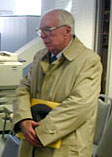Tip sheets highlight timely news and events at Washington University in St. Louis. For more information on any of the stories below or for assistance in arranging interviews, please see the contact information listed with each story.
Labor shortage coming
Older Americans in the workforce essential to economic future

Some economists predict that by 2030, the United States could experience a labor shortage of 35 million workers. Many businesses, including retail giants such as Wal-Mart and McDonalds, have responded to a looming labor shortage by encouraging older workers to remain in the workforce. But a recent study issued by the U.S. General Accounting Office finds that many of the government’s existing employment assistance programs are not providing computer training and other high-tech skills to workers over the age of 55, a demographic that may soon constitute roughly one-third of the entire American workforce. Nancy Morrow-Howell, Ph.D., a professor of social work at Washington University in St. Louis and a leader in the emerging field of productive aging research, contends that America’s economic future may well hinge on our ability to help older adults continue making contributions to society.
Putting theory to the test
Experimental economics flourishes at Olin School of Business

King
Experimental economics — a fast-growing branch of economics that involves the creation of a microeconomic environment in a laboratory — is being widely used at the John M. Olin School of Business. Applications of the exerimental research have multiplied, spanning many industries and producing results that have impacted everything from how airlines price their tickets to how companies manage their employees. Ronald R. King, Ph.D., is helping to lead the burgeoning new area of research at the business school.
Raging Rivers
Nation on the verge of ‘new era in modern river management’

Lowry explores the dynamics behind efforts to restore rivers.
As America celebrates the bicentennial of Lewis & Clark’s epic journey up the untamed Missouri River, the nation finds itself on the verge of a new era in modern river management, one in which proponents of environmental protection and ecosystem restoration stand on equal footing with those of the hydropower, barge and boating industries. In a new book, Dam Politics: Restoring American Rivers (Georgetown University Press, 2003), noted environmental politics expert William R. Lowry explores the dynamics behind recent efforts to restore American river systems to a more pristine state. The politics of river restoration run deep, and it is politics, argues Lowry, that will ultimately dictate the success or failure of future efforts to restore and preserve the nation’s riverways.
Need more than a handshake?
Empirical research shows contracts form the basis for trust in business relationships

Zenger
It takes more than a firm handshake to guarantee trust in any business relationship that’s going to last. In empirical research recently published in Strategic Management Journal, Olin School of Business Professor of Organization and Strategy Todd R. Zenger completed an in-depth survey of senior corporate managers that confirms his suspicions about the importance of contracts in generating trust.